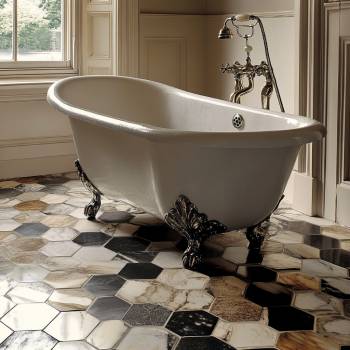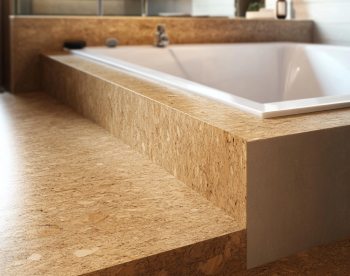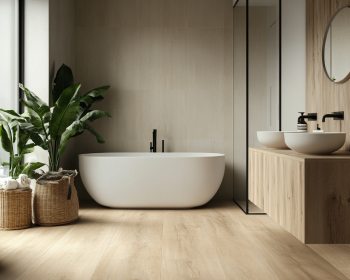Choosing the right flooring for your bathroom is a crucial decision that impacts not only the aesthetics but also the functionality and durability of the space. As Paul Demrovski, owner of PD Home Renovations, Inc. in Waterloo, Ontario, I’ve helped countless homeowners throughout the Greater Toronto Area transform their bathrooms with the right flooring solutions. In this blog, we’ll explore the best flooring options for bathrooms, discussing their pros and cons, cost per square foot, and other important considerations.
Selecting the appropriate flooring for your bathroom is crucial due to the unique challenges posed by moisture and humidity. Ideal bathroom flooring should be water-resistant, slip-resistant, easy to clean, and comfortable.
Luxury vinyl tile (LVT), vinyl roll, porcelain, and ceramic tile are excellent options for bathroom flooring. These materials excel in withstanding moisture and humidity while offering diverse aesthetic possibilities. Vinyl flooring often provides a more budget-friendly solution and can be installed by homeowners, whereas porcelain and ceramic tile typically require professional installation.
When making your selection, consider factors such as desired appearance, budget, and installation complexity.
Ceramic Tile

Ceramic tile remains a popular choice for bathroom flooring due to its durability, water resistance, and aesthetic versatility. Its classic appearance can complement a variety of design styles.
When selecting ceramic tile, consider the color palette carefully. While white tiles create a clean aesthetic, they may require more frequent cleaning. Gray tones offer a balance between style and practicality. To achieve a cohesive look, consider coordinating the floor tile color with wall tiles or shower accents.
While ceramic tile offers numerous advantages, it also presents certain drawbacks. One common complaint is the cold sensation underfoot, which can be mitigated through the installation of a radiant floor heating system. Additionally, ceramic tile can be slippery when wet, emphasizing the importance of selecting a slip-resistant finish.
The installation process for ceramic tile can be complex, even for experienced DIYers. The size of the tiles significantly impacts labor costs and installation time. Smaller tiles require more intricate cutting and placement, while larger tiles may necessitate specialized tools and expertise. Careful consideration of these factors is essential when planning your bathroom remodel.
Vinyl Flooring
Vinyl flooring presents a compelling option for bathroom floors due to its numerous advantages. Renowned for its affordability, vinyl is also exceptionally easy to clean and maintain, making it a practical choice for high-moisture environments. The inclusion of felt or foam backing enhances its comfort and slip resistance, significantly reducing the risk of accidents.
Installation of vinyl flooring is generally less complex compared to other materials, with many homeowners capable of completing the process independently. However, for larger bathroom spaces requiring intricate seaming, professional installation is recommended to ensure optimal results.
While vinyl and linoleum offer numerous benefits, they also have inherent limitations. Due to their softer nature, these flooring options are susceptible to tears and gouges. Additionally, while water-resistant, vinyl and linoleum can be vulnerable to water damage if not properly installed or maintained. To mitigate this risk, opt for high-quality sheet vinyl or linoleum rather than peel-and-stick tiles, as the latter have more seams where water can penetrate. Understanding these drawbacks is essential when considering vinyl or linoleum for your bathroom flooring.
Cork Flooring
Cork flooring has emerged as a compelling choice for bathrooms due to its unique properties. Derived from the bark of the cork oak tree, it is an environmentally friendly material with excellent performance characteristics. Cork’s inherent resistance to mold, mildew, and water damage makes it well-suited for high-humidity environments.

For above-grade installations, glue-down cork tiles offer a versatile option. However, for bathrooms located below ground level, click-in-place planks are recommended to ensure optimal moisture protection.
While cork flooring offers numerous advantages, it’s essential to consider its limitations. Although cork is water-resistant, it’s not entirely waterproof. To maximize its lifespan and durability, it’s advisable to seal unfinished cork with a polyurethane topcoat. Regular resealing every few years is recommended to maintain its integrity.
Cork is susceptible to fading when exposed to prolonged sunlight. For bathrooms with ample natural light, consider using window treatments to protect the floor.
While cork flooring offers numerous advantages, it’s essential to consider its limitations. Although cork is water-resistant, it’s not entirely waterproof. To maximize its lifespan and durability, it’s advisable to seal unfinished cork with a polyurethane topcoat. Regular resealing every few years is recommended to maintain its integrity.
Additionally, cork is susceptible to fading when exposed to prolonged sunlight. For bathrooms with ample natural light, consider using window treatments to protect the floor.
Bamboo Flooring
Bamboo flooring has gained popularity due to its eco-friendliness and affordability. Compared to traditional hardwood, bamboo is a rapidly renewable resource, often costing significantly less. For bathroom applications, engineered bamboo is recommended for its superior durability and moisture resistance. Its ease of installation and the ability to replace damaged planks add to its appeal.
While bamboo offers numerous advantages, it’s essential to be aware of its limitations. Lower-quality bamboo flooring is susceptible to scratches and dents, emphasizing the importance of investing in a durable product. To protect your bamboo floor from moisture damage and wear, proper sealing and maintenance are crucial. Using furniture pads and avoiding excessive water exposure will help prolong its lifespan.
Wood and Laminate Flooring
Hardwood flooring exudes timeless elegance and warmth, making it a popular choice for bathrooms. To mitigate the effects of moisture, engineered hardwood, composed of real wood veneer bonded to plywood, is preferable to solid hardwood. Many prefinished engineered hardwood options offer enhanced water resistance and durability.
Laminate flooring presents a budget-friendly alternative that mimics the appearance of hardwood. Its exceptional resistance to scratches and stains makes it a practical choice for high-traffic areas like bathrooms.
While both options offer aesthetic appeal and durability, careful consideration of factors such as moisture resistance, maintenance requirements, and budget is essential when making a selection.
While offering aesthetic appeal, wood and laminate flooring present specific challenges in bathroom environments. Wood flooring, even in its engineered form, is susceptible to water damage. Prolonged exposure to moisture can lead to warping, swelling, or mold growth. To mitigate these risks, diligent maintenance, including prompt drying of spills and the use of bathmats, is essential.
Laminate flooring, while more water-resistant, can also be affected by excessive moisture. Proper installation and sealing are crucial to prevent water penetration. Additionally, laminate floors may not offer the same level of warmth and comfort as hardwood, impacting the overall bathroom experience.
Next we will mention some of the pros and cons and the cost of several bathroom flooring options.
1. Ceramic and Porcelain Tile
Pros:
- Water-Resistant: Ceramic and porcelain tiles are highly resistant to water, making them ideal for bathrooms.
- Durable: These tiles are extremely durable and can withstand heavy foot traffic.
- Variety: Available in an extensive range of colors, patterns, and textures, allowing for versatile design options.
- Easy Maintenance: Tiles are easy to clean and maintain.
Cons:
- Cold: Tile can be cold underfoot, which may be uncomfortable in colder climates.
- Hard: The surface is hard, which can be tough on feet and unforgiving to dropped items.
- Installation: Installation can be labor-intensive and may require professional help.
Cost:
- Ceramic Tile: Approximately $4 to $12 per square foot in Toronto.
- Porcelain Tile: Approximately $5 to $15 per square foot in Toronto.
2. Vinyl Flooring
Pros:

- Waterproof: Vinyl flooring is completely waterproof, making it an excellent choice for bathrooms.
- Affordable: It is one of the most cost-effective flooring options.
- Comfortable: Softer underfoot compared to tile.
- Easy Installation: Vinyl planks and tiles are relatively easy to install, often suitable for DIY projects.
Cons:
- Durability: While durable, vinyl is not as long-lasting as ceramic or porcelain tile.
- Appearance: It may not have the same high-end look as natural materials.
Cost:
- Vinyl Plank/Tiles: Approximately $2 to $7 per square foot in Toronto.
3. Natural Stone
Pros:
- Aesthetic Appeal: Natural stone like marble, granite, or travertine adds a luxurious and timeless look to any bathroom.
- Durability: Stone is extremely durable and can last a lifetime with proper care.
- Unique: Each piece of natural stone is unique, providing a distinct look.
Cons:
- Cost: Natural stone is one of the most expensive flooring options.
- Maintenance: Requires regular sealing to maintain its water resistance and prevent staining.
- Cold: Can be cold underfoot similar to ceramic and porcelain tiles.
Cost:
- Natural Stone: Approximately $10 to $30 per square foot in Toronto.
4. Laminate Flooring
Pros:
- Affordability: Generally less expensive than hardwood and natural stone.
- Appearance: Can mimic the look of wood or stone.
- Easy Installation: Often designed for easy installation with click-and-lock systems.
Cons:
- Water Resistance: Not as water-resistant as vinyl or tile, though water-resistant options are available.
- Durability: Can be prone to scratches and damage from water if not properly sealed.
Cost:
- Laminate Flooring: Approximately $3 to $8 per square foot in Toronto.
5. Engineered Wood
Pros:
- Aesthetic: Provides the warm and natural look of hardwood.
- Stability: More stable than solid wood in humid environments like bathrooms.
- Variety: Available in a wide range of finishes and styles.
Cons:
- Water Resistance: Less water-resistant than vinyl or tile, though better than solid hardwood.
- Cost: More expensive than laminate but less than natural hardwood.
Cost:
- Engineered Wood: Approximately $6 to $15 per square foot in Toronto.
6. Cork Flooring
Pros:
- Comfort: Softer and warmer underfoot compared to tile and stone.
- Eco-Friendly: A renewable resource that’s environmentally friendly.
- Water Resistance: Naturally water-resistant when properly sealed.
Cons:
- Durability: Can be prone to scratches and dents.
- Maintenance: Requires regular sealing to maintain water resistance.
Cost:
- Cork Flooring: Approximately $5 to $10 per square foot in Toronto.
7. Linoleum
Pros:
- Eco-Friendly: Made from natural materials and is biodegradable.
- Durability: Durable and can last many years with proper care.
- Water Resistance: Naturally water-resistant and suitable for bathrooms.
Cons:
- Appearance: May not appeal to those seeking a high-end look.
- Maintenance: Requires regular sealing to maintain its appearance and durability.
Cost:
- Linoleum: Approximately $4 to $8 per square foot in Toronto.
Call PD Home Renovations Today

Selecting the right flooring for your bathroom involves balancing aesthetics, functionality, durability, and cost. Each option has its unique advantages and potential drawbacks, so it’s important to choose one that best suits your needs and preferences. Whether you prefer the timeless elegance of natural stone, the practicality of vinyl, or the warmth of engineered wood, there’s a perfect flooring option for your bathroom.
Whether you’re looking to refresh your existing bathroom or create a spa-like retreat, understanding the potential scope of DIY projects can empower you to take control of your home improvement journey. Remember, if your project extends beyond your skill set or desired time commitment, PD Home Renovations is here to assist. With over a decade of experience in the Greater Toronto Area, our team of experts can handle all aspects of your bathroom remodel, from concept to completion. For a free quote, please call us at (519) 722-5045.




